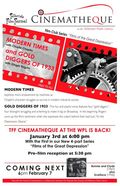01 Jan Telluride Film Festival at Library: Films of the Great Depression
[click “Play”, David Oyster talks about the series on Depression Era films]
 “The best things in life are…” You know the lyric. Ain’t necessarily so except for the upcoming Telluride Film Festival Cinematheque at the five-star Wilkinson Public Library. Round #5 of the FREE Cinematheque series, which begins Monday, January 3, focuses on “Films of the Great Depression.”
“The best things in life are…” You know the lyric. Ain’t necessarily so except for the upcoming Telluride Film Festival Cinematheque at the five-star Wilkinson Public Library. Round #5 of the FREE Cinematheque series, which begins Monday, January 3, focuses on “Films of the Great Depression.”
Too close to home? Well, maybe. Historically relevant? For sure. These films selected by Telluride Film Festival co-director Gary Meyer explore the ways in which cinema provided a forum for social commentary as well as emotional release for its vast audiences.
Monday night is a double feature, opening with Charlie Chaplin’s masterpiece “Modern Times,” (1936, 87 minutes), followed by Busby Berkeley’s “Gold Diggers of 1933 (1933, 97 min.)
In “Modern Times,” Chaplin’s “Little Tramp” struggles to survive the industrialized world run amok. In Chaplin’s view – the actor wrote the script – the desperate straits are the direct result of man’s enslavement to machines.
“Gold Diggers” is an Oscar-nominated musical comedy starring Ginger Rogers, Ruby Keeler, Dick Powell and Joan Blondell. Four showgirls scheme to make it big on Broadway, and staged and choreographed by Busby Berkeley.
“Gold Diggers” was made before the the Motion Picture Production Code (known as the Hays Code, after Hollywood’s chief censor of the time, William H. Hays) was enforced. (The law passed in 1930, but was not in effect until 1934). What that means to the audience can be summed up in one word: skin. The film features naked girls in silhouette, Ginger Rogers essentially exposed in her undergarments and the generally provocative undertones throughout.
Pre-SHOW reception at 5:30 p.m. and screening at 6 p.m. The SHOW includes a “Soup Kitchen LIne” culinary experience, popcorn and beverages.
The Ringmaster is film scholar/ film maker David Oyster.
To learn more about “Modern Times” and “Gold Diggers,” click the “play” button and listen to David Oyster’s interview.


Sorry, the comment form is closed at this time.